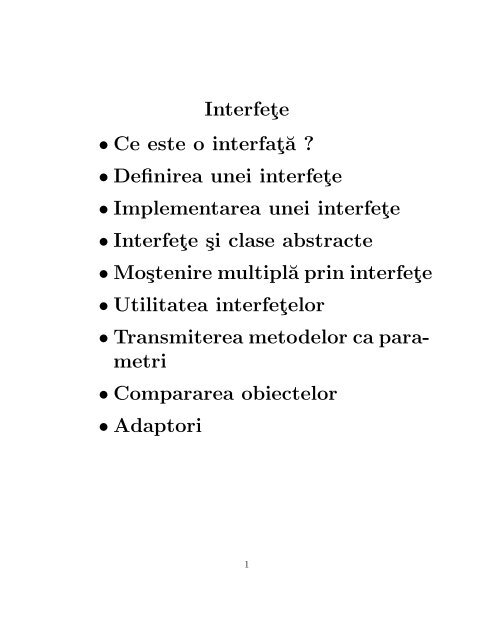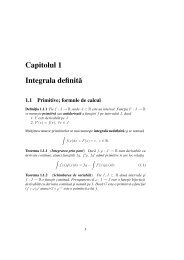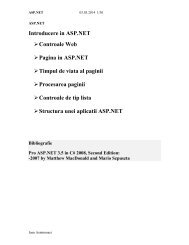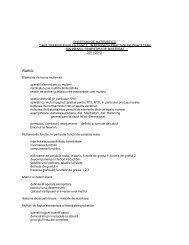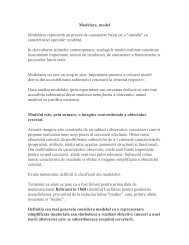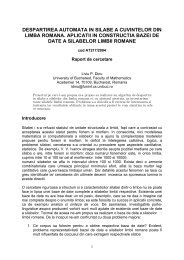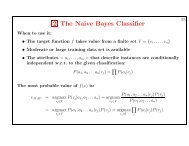Interfete • Ce este o interfat˘a ? • Definirea unei ... - Profs.info.uaic.ro
Interfete • Ce este o interfat˘a ? • Definirea unei ... - Profs.info.uaic.ro
Interfete • Ce este o interfat˘a ? • Definirea unei ... - Profs.info.uaic.ro
Create successful ePaper yourself
Turn your PDF publications into a flip-book with our unique Google optimized e-Paper software.
Interfet¸e<br />
<st<strong>ro</strong>ng>•</st<strong>ro</strong>ng> <st<strong>ro</strong>ng>Ce</st<strong>ro</strong>ng> <st<strong>ro</strong>ng>este</st<strong>ro</strong>ng> o interfat¸ă ?<br />
<st<strong>ro</strong>ng>•</st<strong>ro</strong>ng> <st<strong>ro</strong>ng>Definirea</st<strong>ro</strong>ng> <st<strong>ro</strong>ng>unei</st<strong>ro</strong>ng> interfet¸e<br />
<st<strong>ro</strong>ng>•</st<strong>ro</strong>ng> Implementarea <st<strong>ro</strong>ng>unei</st<strong>ro</strong>ng> interfet¸e<br />
<st<strong>ro</strong>ng>•</st<strong>ro</strong>ng> Interfet¸e ¸si clase abstracte<br />
<st<strong>ro</strong>ng>•</st<strong>ro</strong>ng> Mo¸stenire multiplă prin interfet¸e<br />
<st<strong>ro</strong>ng>•</st<strong>ro</strong>ng> Utilitatea interfet¸elor<br />
<st<strong>ro</strong>ng>•</st<strong>ro</strong>ng> Transmiterea metodelor ca parametri<br />
<st<strong>ro</strong>ng>•</st<strong>ro</strong>ng> Compararea obiectelor<br />
<st<strong>ro</strong>ng>•</st<strong>ro</strong>ng> Adaptori<br />
1
<st<strong>ro</strong>ng>Ce</st<strong>ro</strong>ng> <st<strong>ro</strong>ng>este</st<strong>ro</strong>ng> o interfat¸ă ?<br />
DEX: (<st<strong>ro</strong>ng>info</st<strong>ro</strong>ng>rm.) f<strong>ro</strong>ntieră convent¸ională<br />
între două sisteme sau unitat¸i, care permite<br />
schimburi de <st<strong>ro</strong>ng>info</st<strong>ro</strong>ng>rmat¸ii după anumite<br />
reguli.<br />
<st<strong>ro</strong>ng>•</st<strong>ro</strong>ng> Separarea modelului de implementare<br />
<st<strong>ro</strong>ng>•</st<strong>ro</strong>ng> P<strong>ro</strong>tocol de comunicare<br />
<st<strong>ro</strong>ng>•</st<strong>ro</strong>ng> Tip de date<br />
<st<strong>ro</strong>ng>•</st<strong>ro</strong>ng> Colect¸ie de metode abstracte<br />
¸si declarat¸ii de constante<br />
<st<strong>ro</strong>ng>•</st<strong>ro</strong>ng> Clasele pot implementa interfet¸e<br />
2
<st<strong>ro</strong>ng>Definirea</st<strong>ro</strong>ng> <st<strong>ro</strong>ng>unei</st<strong>ro</strong>ng> interfet¸e<br />
[public] interface NumeInterfata<br />
[extends SuperInterfata1, SuperInterfata2...]<br />
{<br />
/* Corpul interfetei:<br />
Declaratii de constane<br />
Declaratii de metode abstracte<br />
*/<br />
}<br />
interface Exemplu {<br />
int MAX = 100; // echivalent cu:<br />
public static final int MAX = 100;<br />
int MAX; // Incorect, lips<st<strong>ro</strong>ng>este</st<strong>ro</strong>ng> initializarea<br />
private int x = 1;<br />
// Incorect, modificator nepermis<br />
void metoda(); // Echivalent cu:<br />
public void metoda();<br />
p<strong>ro</strong>tected void metoda2();<br />
// Incorect, modificator nepermis<br />
3
Implementarea <st<strong>ro</strong>ng>unei</st<strong>ro</strong>ng> interfet¸e<br />
class NumeClasa implements NumeInterfata<br />
sau<br />
class NumeClasa implements Interfata1,<br />
Interfata2, ...<br />
O clasă care implementează o interfat¸ă<br />
trebuie obligatoriu să specifice cod pentru<br />
toate metodele interfet¸ei.<br />
Implementarea <st<strong>ro</strong>ng>unei</st<strong>ro</strong>ng> interfet¸e poate să<br />
fie ¸si o clasă abstractă.<br />
Spunem că un obiect are tipul X, unde<br />
X <st<strong>ro</strong>ng>este</st<strong>ro</strong>ng> o interfat¸ă, dacă acesta <st<strong>ro</strong>ng>este</st<strong>ro</strong>ng> o<br />
instant¸ă a <st<strong>ro</strong>ng>unei</st<strong>ro</strong>ng> clase ce implementează<br />
interfat¸a X.<br />
4
Exemplu: implementarea <st<strong>ro</strong>ng>unei</st<strong>ro</strong>ng><br />
stive<br />
Listing 1: Interfat¸a ce descrie stiva<br />
public interface Stack {<br />
void push ( Object item ) th<strong>ro</strong>ws StackException ;<br />
void pop () th<strong>ro</strong>ws StackException ;<br />
Object peek () th<strong>ro</strong>ws StackException ;<br />
boolean empty ();<br />
String toString ();<br />
}<br />
Listing 2: Implementarea stivei folosind un vector<br />
// Implementarea stivei folosind un vector de obiecte .<br />
public class StackImpl1 implements Stack {<br />
private Object items [];<br />
// Vectorul ce contine obiectele<br />
private int n =0;<br />
// Numarul curent de elemente din stiva<br />
public StackImpl1 ( int max ) {<br />
// Constructor<br />
items = new Object [ max ];<br />
}<br />
public StackImpl1 () {<br />
this (100) ;<br />
}<br />
public void push ( Object item ) th<strong>ro</strong>ws StackException {<br />
if (n == items . length )<br />
th<strong>ro</strong>w new StackException (" Stiva <st<strong>ro</strong>ng>este</st<strong>ro</strong>ng> plina !");<br />
items [n ++] = item ;<br />
}<br />
public void pop () th<strong>ro</strong>ws StackException {<br />
if ( empty ())<br />
th<strong>ro</strong>w new StackException (" Stiva <st<strong>ro</strong>ng>este</st<strong>ro</strong>ng> vida !");<br />
items [--n] = null ;<br />
5
}<br />
}<br />
public Object peek () th<strong>ro</strong>ws StackException {<br />
if ( empty ())<br />
th<strong>ro</strong>w new StackException (" Stiva <st<strong>ro</strong>ng>este</st<strong>ro</strong>ng> vida !");<br />
return items [n -1];<br />
}<br />
public boolean empty () {<br />
return (n ==0) ;<br />
}<br />
public String toString () {<br />
String s="";<br />
for ( int i=n -1; i >=0; i - -)<br />
s += items [i]. toString () + " ";<br />
return s;<br />
}<br />
public class TestStiva {<br />
Listing 3: Folosirea stivei<br />
public static void afiseaza ( Stack s) {<br />
System . out . println (" Continutul stivei <st<strong>ro</strong>ng>este</st<strong>ro</strong>ng> : " + s);<br />
}<br />
public static void main ( String args []) {<br />
try {<br />
Stack s1 = new StackImpl1 ();<br />
s1. push ("a");<br />
s1. push ("b");<br />
afiseaza (s1);<br />
}<br />
Stack s2 = new StackImpl2 ();<br />
s2. push ( new Integer (1) );<br />
s2. push ( new Double (3.14) );<br />
afiseaza (s2);<br />
} catch ( StackException e) {<br />
System . err . println (" E<strong>ro</strong>are la lucrul cu stiva !");<br />
e. printStackTrace ();<br />
}<br />
6
}<br />
7
Interfet¸e ¸si clase abstracte<br />
<st<strong>ro</strong>ng>•</st<strong>ro</strong>ng> Extinderea <st<strong>ro</strong>ng>unei</st<strong>ro</strong>ng> clase abstracte<br />
fort¸ează o relat¸ie între clase;<br />
<st<strong>ro</strong>ng>•</st<strong>ro</strong>ng> Implementarea <st<strong>ro</strong>ng>unei</st<strong>ro</strong>ng> interfet¸e<br />
specifică doar necesitatea implementării<br />
unor anumie metode.<br />
Interfet¸ele ¸si clasele abstracte<br />
nu se exclud, fiind folosite împreună:<br />
<st<strong>ro</strong>ng>•</st<strong>ro</strong>ng> List<br />
<st<strong>ro</strong>ng>•</st<strong>ro</strong>ng> AbstractList<br />
<st<strong>ro</strong>ng>•</st<strong>ro</strong>ng> LinkedList, ArrayList<br />
8
Mo¸stenire multiplă prin interfet¸e<br />
class NumeClasa<br />
implements Interfata1, Interfata2, ...<br />
interface NumeInterfata<br />
extends Interfata1, Interfata2, ...<br />
Ierarhia interfet¸elor <st<strong>ro</strong>ng>este</st<strong>ro</strong>ng> independentă<br />
de ierarhia claselor care le implementează.<br />
interface I1 {<br />
int a=1;<br />
void metoda1();<br />
}<br />
interface I2 {<br />
int b=2;<br />
void metoda2();<br />
}<br />
class C implements I1, I2 {<br />
void metoda1() {...}<br />
void metoda2() {...}<br />
}<br />
9
Ambiguităt¸i<br />
interface I1 {<br />
int x=1;<br />
void metoda();<br />
}<br />
interface I2 {<br />
int x=2;<br />
void metoda(); //corect<br />
//int metoda(); //incorect<br />
}<br />
class C implements I1, I2 {<br />
public void metoda() {<br />
System.out.println(I1.x); //corect<br />
System.out.println(I2.x); //corect<br />
System.out.println(x); //ambiguitate<br />
}<br />
}<br />
10
Utilitatea interfet¸elor<br />
<st<strong>ro</strong>ng>•</st<strong>ro</strong>ng> <st<strong>ro</strong>ng>Definirea</st<strong>ro</strong>ng> unor similaritati între<br />
clase independente.<br />
<st<strong>ro</strong>ng>•</st<strong>ro</strong>ng> Impunerea unor specificat¸ii<br />
<st<strong>ro</strong>ng>•</st<strong>ro</strong>ng> <st<strong>ro</strong>ng>Definirea</st<strong>ro</strong>ng> unor grupuri de constante<br />
<st<strong>ro</strong>ng>•</st<strong>ro</strong>ng> Transmiterea metodelor ca parametri<br />
Crearea grupurilor de constante<br />
public interface Luni {<br />
int IAN=1, FEB=2, ..., DEC=12;<br />
}<br />
...<br />
if (luna < Luni.DEC)<br />
luna ++<br />
else<br />
luna = Luni.IAN;<br />
11
Transmiterea metodelor ca parametri<br />
interface Functie {<br />
public void executa(Nod u);<br />
}<br />
class Graf {<br />
//...<br />
void explorare(Functie f) {<br />
//...<br />
if (explorarea a ajuns in nodul v)<br />
f.executa(v);<br />
}<br />
}<br />
}<br />
//Definim diverse functii<br />
class AfisareRo implements Functie {<br />
public void executa(Nod v) {<br />
System.out.println("Nodul curent <st<strong>ro</strong>ng>este</st<strong>ro</strong>ng>: " + v);<br />
}<br />
}<br />
class AfisareEn implements Functie {<br />
public void executa(Nod v) {<br />
System.out.println("Current node is: " + v);<br />
}}<br />
12
Callback = secventa de cod care <st<strong>ro</strong>ng>este</st<strong>ro</strong>ng> trimisa ca argument<br />
<st<strong>ro</strong>ng>unei</st<strong>ro</strong>ng> metode.<br />
public class TestCallBack {<br />
public static void main(String args[]) {<br />
Graf G = new Graf();<br />
}<br />
}<br />
Functie f1 = new AfisareRo();<br />
G.explorare(f1);<br />
Functie f2 = new AfisareEn();<br />
G.explorare(f2);<br />
/* sau mai simplu:<br />
G.explorare(new AfisareRo());<br />
G.explorare(new AfisareEn());<br />
*/<br />
13
Interfat¸a FilenameFilter<br />
Listing 4: Listarea fi¸sierelor cu o anumită extensie<br />
/* Listarea fisierelor din directorul curent<br />
care au anumita extensie primita ca argument .<br />
Daca nu se prim<st<strong>ro</strong>ng>este</st<strong>ro</strong>ng> nici un argument , vor fi listate toate<br />
.<br />
*/<br />
import java .io .*;<br />
class Listare {<br />
}<br />
public static void main ( String [] args ) {<br />
try {<br />
File director = new File (".");<br />
String [] list ;<br />
if ( args . length > 0)<br />
list = director . list ( new Filtru ( args [0]) );<br />
else<br />
list = director . list ();<br />
}<br />
for ( int i = 0; i < list . length ; i ++)<br />
System . out . println ( list [i]);<br />
} catch ( Exception e) {<br />
e. printStackTrace ();<br />
}<br />
class Filtru implements FilenameFilter {<br />
String extensie ;<br />
Filtru ( String extensie ) {<br />
this . extensie = extensie ;<br />
}<br />
public boolean accept ( File dir , String nume ) {<br />
return ( nume . endsWith ("." + extensie ) );<br />
}<br />
}<br />
14
Folosirea claselor anonime<br />
Clasa anonimă = clasă internă<br />
folosită pentru instant¸ierea unui<br />
singur obiect.<br />
metoda(new Interfata() {<br />
// Implementarea metodelor interfetei<br />
});<br />
if (args.length > 0) {<br />
final String extensie = args[0];<br />
list = director.list(new FilenameFilter() {<br />
// Clasa interna anonima<br />
public boolean accept (File dir, String nume) {<br />
return ( nume.endsWith("." + extensie) );<br />
}<br />
});<br />
}<br />
15
Compararea obiectelor<br />
Listing 5: Clasa Persoana (fără suport pentru comparare)<br />
class Persoana {<br />
int cod ;<br />
String nume ;<br />
}<br />
public Persoana ( int cod , String nume ) {<br />
this . cod = cod ;<br />
this . nume = nume ;<br />
}<br />
public String toString () {<br />
return cod + " \t " + nume ;<br />
}<br />
Listing 6: Sortarea unui vector de tip referint¸ă<br />
class Sortare {<br />
public static void main ( String args []) {<br />
Persoana p[] = new Persoana [4];<br />
p [0] = new Persoana (3 , " Ionescu ");<br />
p [1] = new Persoana (1 , " Vasilescu ");<br />
p [2] = new Persoana (2 , " Georgescu ");<br />
p [3] = new Persoana (4 , " Popescu ");<br />
}<br />
}<br />
java . util . Arrays . sort (p);<br />
System . out . println (" Persoanele ordonate dupa cod :");<br />
for ( int i =0; i
Interfat¸a Comparable<br />
public interface Comparable {<br />
int compareTo(Object o);<br />
}<br />
Listing 7: Clasa Persoana cu suport pentru comparare<br />
class Persoana implements Comparable {<br />
int cod ;<br />
String nume ;<br />
}<br />
public Persoana ( int cod , String nume ) {<br />
this . cod = cod ;<br />
this . nume = nume ;<br />
}<br />
public String toString () {<br />
return cod + " \t " + nume ;<br />
}<br />
public boolean equals ( Object o) {<br />
if (!( o instanceof Persoana ))<br />
return false ;<br />
Persoana p = ( Persoana ) o;<br />
return ( cod == p. cod ) && ( nume . equals (p. nume ));<br />
}<br />
public int compareTo ( Object o) {<br />
if (o== null )<br />
th<strong>ro</strong>w new NullPointerException ();<br />
if (!( o instanceof Persoana ))<br />
th<strong>ro</strong>w new ClassCastException ("Nu pot compara !");<br />
}<br />
Persoana p = ( Persoana ) o;<br />
return ( cod - p. cod );<br />
17
Interfat¸a Comparator<br />
Listing 8: Sortarea unui vector folosind un comparator<br />
import java . util .*;<br />
class Sortare {<br />
public static void main ( String args []) {<br />
Persoana p[] = new Persoana [4];<br />
p [0] = new Persoana (3 , " Ionescu ");<br />
p [1] = new Persoana (1 , " Vasilescu ");<br />
p [2] = new Persoana (2 , " Georgescu ");<br />
p [3] = new Persoana (4 , " Popescu ");<br />
}<br />
}<br />
Arrays . sort (p, new Comparator () {<br />
public int compare ( Object o1 , Object o2) {<br />
Persoana p1 = ( Persoana )o1;<br />
Persoana p2 = ( Persoana )o2;<br />
return (p1. nume . compareTo (p2. nume ));<br />
}<br />
});<br />
System . out . println (" Persoanele ordonate dupa nume :");<br />
for ( int i =0; i
Adaptori<br />
interface X {<br />
void metoda_1();<br />
void metoda_2();<br />
...<br />
void metoda_n();<br />
}<br />
...<br />
// Avem nevoie de un obiect de tip X<br />
// ca argument al <st<strong>ro</strong>ng>unei</st<strong>ro</strong>ng> functii<br />
functie(new X() {<br />
public void metoda_1() {<br />
// Singura metoda care ne intereseaza<br />
...<br />
}<br />
// Trebuie sa apara si celelalte metode<br />
// chiar daca nu au implementare efectiva<br />
public void metoda_2() {}<br />
public void metoda_3() {}<br />
...<br />
public void metoda_n() {}<br />
});<br />
19
Un adaptor <st<strong>ro</strong>ng>este</st<strong>ro</strong>ng> o clasă abstractă<br />
care implementează o anumită interfat¸ă<br />
fără a specifica cod nici <st<strong>ro</strong>ng>unei</st<strong>ro</strong>ng> metode a<br />
interfet¸ei.<br />
public abstract class XAdapter implements X {<br />
public void metoda_1() {}<br />
public void metoda_2() {}<br />
...<br />
public void metoda_n() {}<br />
}<br />
functie(new XAdapter() {<br />
public void metoda_1() {<br />
// Singura metoda care ne intereseaza<br />
...<br />
}<br />
});<br />
20


